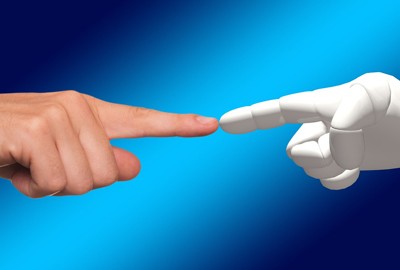Source – pacetoday.com.au
Self-learning machines and smart robots are the basis for future technologies in many industries. AI gives computers humanoid and cognitive abilities that can lead to an increase in productivity. In addition, machine learning (ML) systems are employed to assess problems and needs and resolve them accordingly.
In recent years, extensive progress has been made with artificial intelligence: Watson, Siri, and deep learning are just a few examples which show how AI systems can now perform services which can be classified as intelligent and creative. Companies that want to optimise their business or save costs will hardly be able to dispense with artificial intelligence. A computer, much like a human, saves knowledge gleaned from experiences and can then independently derive solutions – based on algorithms – to new and unknown problems. To do this, a computer program analyses samples and, using self-learning algorithms, tries to recognise certain patterns and regularities in the data.
AI systems are, without a doubt, extremely useful
The world is becoming ever more complex, meaning that a well thought-out and wise use of our human resources is required. This is where high-quality computer systems can help. It also applies to applications that require intelligence. The downside of AI is that the possibility of intelligent machines is something that scares many people who argue that intelligence is something unique, something that sets Homo sapiens apart from mere machines.
The quest for an artificial copy of man and the issues associated with this are not entirely new. Our ancestors already invested much thought in the reproduction and imitation of thinking.
Economists expect that this technology will greatly increase prosperity. Previous studies have been restricted to investigating the impact of intelligent automation, for example, when machines in networked factories communicate with each other or when autonomous vehicles, transport goods or people without drivers. This view, however, neglects other growth-stimulating effects of intelligent systems: artificial intelligence will support people in their work and make them more productive.
Economic growth through AI
According to a recent study by the consulting firm Accenture, artificial intelligence will give the German economy a huge growth spurt. Many work processes will become more efficient and staff will be able to focus more on tasks with a high value added, as machines and programs take care of many routine activities formerly dealt with by not only assembly line workers, but also knowledge workers. According to a different study by McKinsey, the global market for AI services has an annual growth rate of up to 25% and is projected to be worth around 125 billion euros by the year 2025.
Machine learning is becoming more and more mainstream. While self-learning programs were only to be found in universities, research institutions, and some technology companies up until a few years ago, nowadays they are finding their way into ordinary products and solutions. Our everyday life and our business lives are increasingly being determined by intelligent programs that learn from data and extrapolate from what they have learnt.
Speech recognition on mobile phones, for example, is essentially controlled by machine-learning algorithms – much like the spam filters in PCs and notebooks or face detection in the management of photos. We are often in contact with learning systems without being aware of it – such as personalised online advertising. More and more companies are recognising the value of machine learning when it comes to optimising their business and saving costs.
What work is left for the people?
Although robots can take over communications, computing, and thinking, there will be limits even here. There will be still be the need for highly qualified professionals, such as engineers, architects, or judges. Also tasks, whose dexterity remains beyond that of robot fingers will remain for the foreseeable future.
Machines cannot replace the emotional intelligence of a person. Occupations that require social skills or creativity or represent a high-quality personal service cannot be substituted by AI.
Certainly, some professions will disappear completely and, in many areas, the requirements will change greatly. However, there is no need to panic just yet.
Flexibility is needed
Tech companies such as Apple and Microsoft want to automate as many working processes as possible with learning machines.
The employees of tomorrow must be more flexible, because in the future man will have to adapt to the computer and not vice versa.
Employees will have to adjust to more flexible working practices: a fixation on permanent locations and times is often no longer required. This implies more flexibility and freedom on the one hand, but on the other hand, that work and personal time will intermingle.
In addition to the technical expertise, specialist and managerial staff must bring a more in-depth process knowledge and have a higher willingness to undergo independent and ongoing training in the appropriate technologies. What is more, a good understanding of all security-relevant questions relating to IT technology and legal security will be a basic requirement.
New careers in IT
According to Bernhard Rohleder, Managing Director of BITKOM, new, exciting and challenging jobs will be created. However, they require a good education and offer much creative freedom and responsibility.
The number of workers with low-grade qualifications will fall, but staff with correspondingly high, mainly digital skills are now already increasingly in demand. The number of employees in the IT industry has been increasing continuously for years, as do the number of vacancies in this sector that are difficult to fill.
And there’s more: even if artificial intelligence means that we are talking about machine learning, a harmonious combination of machine and human intelligence working as a single unit is required to develop theories and to confront new challenges. Working on the basis of the existing data, it is possible to develop company-specific business ideas, whether in the form of products, processes, or new data-based business models.
